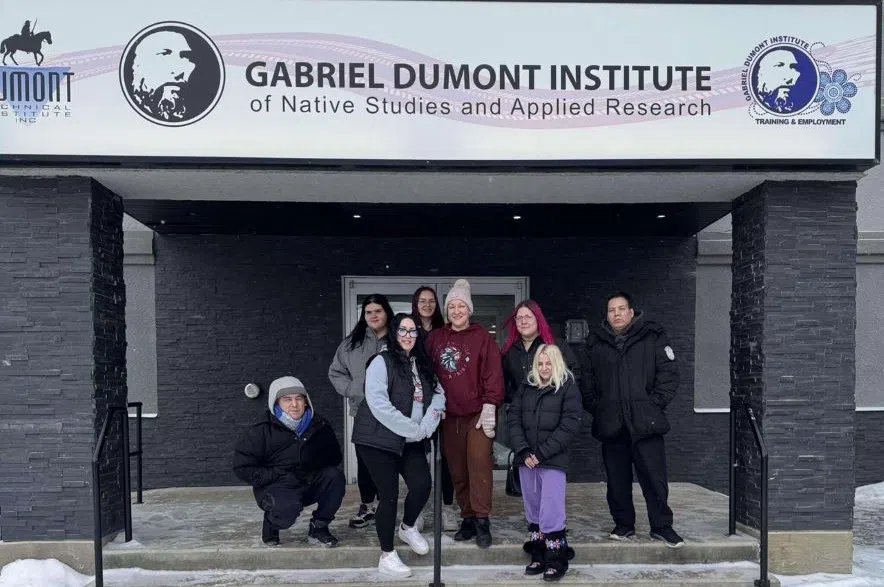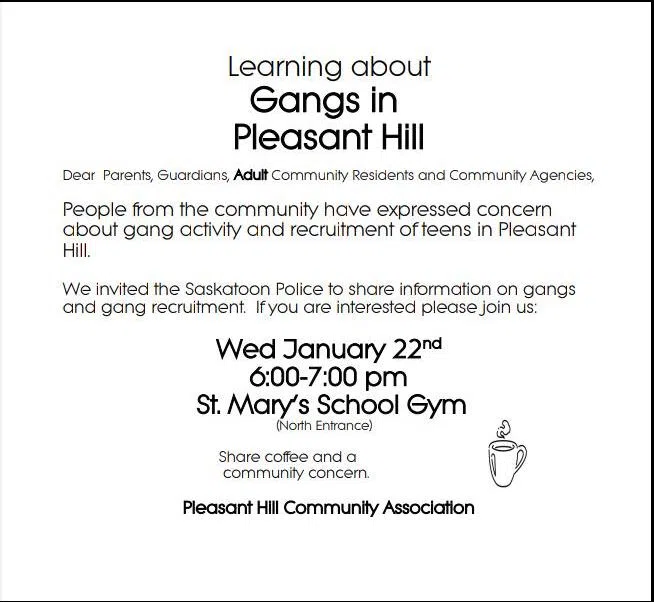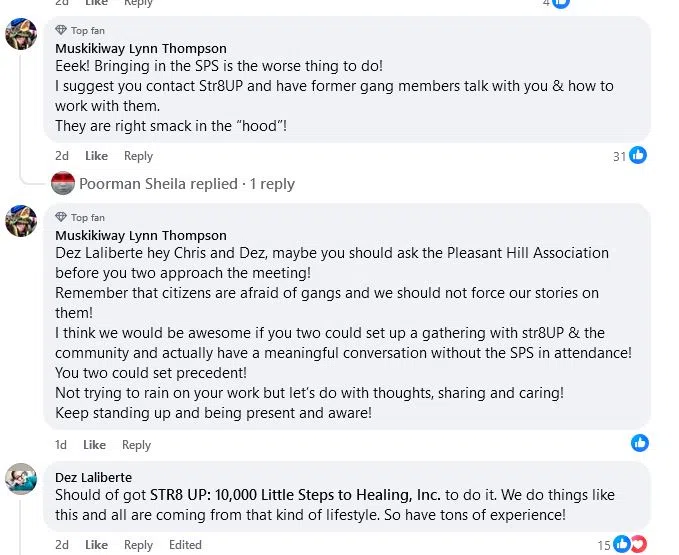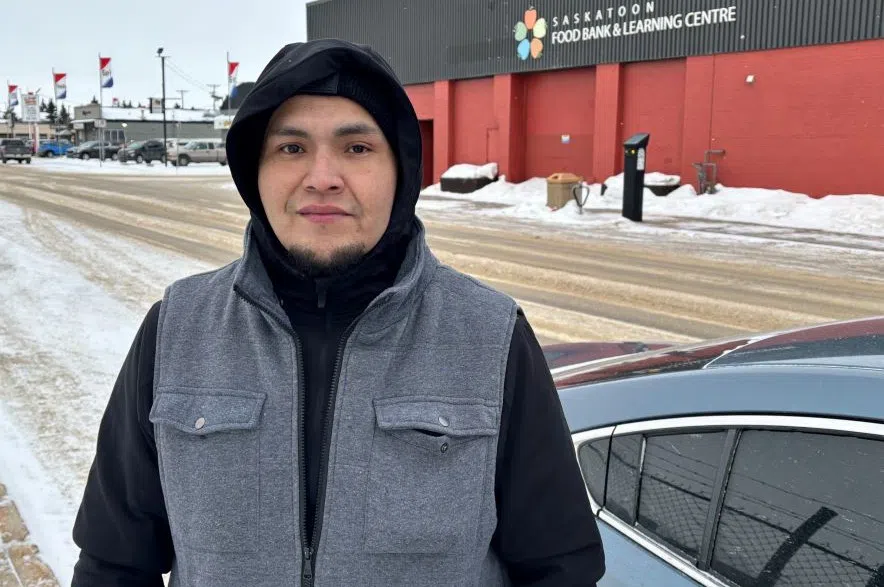There are growing concerns in at least one of Saskatoon’s core neighbourhoods about gang activity and active recruitment of teenagers.
Those concerns were highlighted in a notice sent out this week by the Pleasant Hill Community Association, indicating that residents who hoped to speak out about it, or to learn more about what’s happening, could do so with Saskatoon Police officers.
The meeting, advertised on the group’s Facebook page, was cancelled just a short time before it was scheduled to go ahead. No reason for the cancellation was given.
Comments on the social media post, indicated that those who’ve experienced gang life previously should be able to offer their help and perspectives on keeping kids out of gangs and relay their lived experience.
Travis’ story
Travis Buffalo hopes to make a difference in his community.
Growing up in Regina’s North Central neighbourhood, he witnessed a lot of violence and a lot of inter-generational trauma in his own family.
“I was very angry. At a young age, I was violent…That’s where I put my first mask on and at a very young age that’s not a good thing to do,” he said.
By the time he was a pre-teen, he was using drugs and alcohol daily. He came with his father to Saskatoon after his parents separated. There he began witnessing intravenous drug use on a regular basis.
“Long story short, I found myself in the penitentiary because of selling drugs, gangs, violence, drug use and that’s kinda where this journey I’m on now, began,” he said.
In prison for three years, that’s where someone from Saskatoon’s “STR8 UP” outreach and support group approached him about changing his life. Small steps and healing with guidance from Elders and others led him to eventually apply for a job with the Saskatoon Food Bank where he now works.
He’s blunt in his advice.
“It’s always going to be there. There’s no way to battle it directly head-on and stop it. There’s drugs. Drugs lead to gangs and that’s it,” he said.
But he also says the way to help those thinking of joining a gang or someone who wants to get out, is to “plant seeds” of hope and give people opportunities to find and learn more about their culture.
He knows there are a lot of families struggling, but belonging to a gang — isn’t the way out.
“Sure this man here is telling you ‘do this’ for him and he’ll take care of you. The reality is, as soon as you do that, you’re doing something else, you’re doing something else, something else. Then you’re in a gang.”
“Next thing you know, you’re going to jail for 10 years and they don’t take care of you in jail. You’re outta site, you’re outta mind,” he explained.
Buffalo feels strongly about taking part in community talks about gangs.
“People like myself are the ones who should have a say in anything like this.”

Desiree Laliberte (centre) was on the streets and in a gang from the time she was 13-years-old — until three years ago — when she was 33-years-old. She said her homelife “led me to search for my own family, to have that sense of belonging.” (Desiree Laliberte/submitted)
Desiree’s story
Desiree Laliberte has overcome addiction, abuse and grew up in a home plagued by drugs and alcoholism in Green Lake, Saskatchewan.
“It led me to search for my own family, to have that sense of belonging,” she said.
She was on the streets and in a gang from the time she was 13-years-old — until three years ago — when she was 33-years-old.
“A lot of these people coming from these backgrounds, it’s not ’cause we choose to do that, it’s because that’s all we know. They’re coming from generational trauma, from residential schools.”
“The drugs are taking over. It’s corrupting our people,” she added.
Laliberte also cautions that gang recruitment doesn’t just happen on the streets, it happens in schools, with friends and family who may be associates.
“I thought it was the only place I felt welcomed. However, growing up and realizing there’s lots of other ways to get the help that you need in a positive way, other than that. It just stems from our childhood and our upbringing,” she explained.
She too became involved in STR8 Up, an organization for ex-gang members that helps build structure, foundation and accountability.
Desiree also feels strongly about community members learning from those who have lived experience in gangs.
“A lot of it comes from home. (Parents) they need to take a look at what’s going on at home,” she said.
Once she found her “right people,” getting away from a gang became easier. Now, she’s in school and hopes to one day attend First Nations University with a specialty in Indigenous social work.

A new date for the Pleasant Hill Community Association meeting has not been advertised on social media as of publication. The original meeting was cancelled without an online explanation. (Pleasant Hill Community Association meeting/Facebook)
Saskatoon Police and community representatives
CKOM has reached out to the Pleasant Hill Community Association for comment on the meeting, without success.
Saskatoon Police Chief Cameron McBride said engaging with community associations is something the SPS believes is important.
He acknowledges that gang recruitment in core neighbourhoods like Pleasant Hill is a problem.
“I hear that through our school liaison officers, I’ve heard that through my own work within community (sic). It’s certainly of significant concern for us as an organization.”
“Our guns and gangs unit is actively pursuing complaints. Actively pursuing investigations into gang activity of that nature,” he said.

Desiree spoke online about how community members should be learning from those who have lived experience in gangs. (Pleasant Hill Community Association announcement/Facebook)
Ward 2 Coun. Senos Timon was not aware of the community association meeting but said teen gang recruitment was a concern he often heard of last fall.
“The presence of gangs’ activities, yes, that has been an ongoing challenge in that community. I heard that from the doorsteps as well when I was campaigning. It’s one of the top things that we’re really working to see how we can address the safety concerns,” he said.
A new date for the Pleasant Hill Community Association meeting has not been advertised on social media as of publication.











